Austerity Again (Part Two): HOW does this keep happening?
When we ask why people are choosing austerity when it doesn't 'work', we're missing the point. It works brilliantly for those who want it.
Welcome to part two of a double-fist punch of BCS in this week of economic news. As we’ve seen, whether Labour admit it or not, it’s austerity time again. Sigh. Please share this blog with like-minded friends, or people you don’t like who deserve to feel angry and sad.
So, here we are again. Reeves brings us Austerity, part… 2? …3? 23? Are there still numbers? Is this not getting a bit like the Fast and the Furious movies, where we’ll have to stop using Roman numerals because they won’t fit on a poster? Should we move to base 10?
The sheer sense of a gutpunch - and an insult to injury - came for me in Reeves’ snotty derision of those of us who disagree:
“There's nothing progressive about working people paying the price for economic irresponsibility." - Rachel Reeves, Spring Statement 2025
This is peevish and patronising, and note who is is aimed at. The people she is addressing are ‘us’: the ‘progressives’ who voted for her. (I mean look, it’s not like there was an alternative to voting for them, but you could at least not actively insult me, Rachel.)
Anyway, we’re not going away. I’m getting shriller and angrier. A lot of people are. I can feel a groundswell which is different than I have seen before, in quite a long time of following politics. People now are not just angry - they are informed.
When NCVO published the most stunningly equanimous ‘the chancellor has to make hard decisions’ post this morning, asking the Government to make sure it involves charities in making sure institutionalised abandonment of the poor was humane, a lot of people were pretty grossed out. I’m sure I made another enemy. But guys, read the room. Nobody feels like that any more. I understand it’s hard to position yourself as avowedly in between - but this is wrong, and everybody knows it. This is the weak link of the Civil Society Covenant approach right here: is it at the cost of taking a moral and political stance? Because I would not sign that covenant, and most people in charities wouldn’t either.
It’s not about what works
But we need to be clear-eyed about why this is happening. You might be saying: ‘We know it just doesn't ‘work’: the UK never recovered from the 2008 crash, while Germany and the US did, because they didn’t impose austerity. Biden avoided a major downturn post-COVID in the same way. Trump and DOGE’s cuts likely to take it the other way.’ You might be saying that the economic evidence is blindingly obvious: austerity doesn't ‘fix’ economies, it shrinks them. And it worsens inequality and injustice. But what I want to say is that actually, that is not an accident. In fact, austerity works incredibly well for some.
So today we ask: how did we get here? And how do we KEEP getting here? The answer is because austerity works so very well.
The battles now happening are not just about sickness and disability benefits, much as those are the most immediate concerns for most readers of this blog. Indeed, in some ways it is helpful for those in power to have us think that’s all it is. The questions are much deeper, and come down to fundamental questions about the role of the state, the role of money, and the role of economic ‘theory’ in economics - essentially to ‘political economy’. That is, the political decisions we make about economic policy, which are always ideological and based on the vision of the world we want to achieve.
How to have austerity AGAIN
Politicians of left and right these days tend to claim that austerity is the only way - it is the natural way of the world, a natural fact, rather than a decision about how we apportion resources. It is the myth, as Margaret Thatcher put it, that ‘The facts of life are Conservative.’
I’ve talked about it before, but Clara Mattei’s The Capital Order: How Economists Invented Austerity and Paved the Way to Fascism offers a convincing account across the history of the twentieth century. She notes how austerity - involving the destruction of social and welfare programmes, regressive taxation and upward redistribution, deliberate shrinking of the workforce and driving down wages) - has always been designed precisely to control working class people. It stops them demanding more. Repeatedly, what the economic elites have discovered is that if you give people a little more - through welfare, or ameliorations to working conditions, or public services - they simply start to ask for more.
But it’s not just because if you ‘give them an inch, they’ll take a mile.’ The reason is that when people see you choose to make concessions, they see what is possible. They quickly see that concentrating all wealth and opportunity on a few people is not a necessary fact of life. It is a choice. For example, COVID demonstrated that you literally can just give people money to stay home. World War II demonstrated that you could centralise an economy, equalise basic necessities of life, have full employment, and reduce inequality. The cat is out of the bag, and licking its bum in full view of your mother in law.
Once people start to realise that, austerity has to be introduced - and notice how it follows as surely as night follows day. This is, Mattei shows, not because we have spent everything and most now pay back a ‘debt’. It’s because we have got far too close to a world that is different from the standard relations of capitalism. Wealth must reassert itself, or all may be lost.
Making people poorer, more miserable, less well-educated, unhealthier, more likely to be unemployed, without alternatives to exploitative conditions, also makes it a lot easier to control them. It sets them against each other, stops them being able to resist domination - for example by striking - and takes way their power to withdraw their labour.
Of course, in order to be able to reassert power through austerity, you need to have a ‘reason’ to do it. So the myth then created is that austerity is the natural way of the world. Mattei shows extensive, successful efforts to create this narrative afte the First World War by politicians and a new class of economic ‘scientists’ across the world. Their new claim was that austerity was a natural scientific fact, like gravity. For this reason, you must do things like handing control to technocratic economic ‘scientists’ who manage the economy purely on the basis of the wealthy, but claim they are doing so because it cannot be any other way.
But never doubt for a second: austerity is not austerity for a whole state, or a population. It is always austerity for the poor - and a holiday bonanza for wealth.
The bigger picture: the battles for economic theory
There is a whole range of debates happening around economics, and constant battles for supremacy of economic theories. Still we have the economic ‘orthodoxy’ of neoliberal monetarist fiscal conservative capitalism. We have to remember that this was a crackpot theory that no economist in their right mind believed in until the rise of Thatcher and Reagan, who took it from the margins to the mainstream knowing full well it would unleash the kind of inequality we have seen develop.
This approach remains popular politically on the right because it cements the wealth and power of the wealthy and powerful. It remains ‘popular’ on the left because oligarchs have long been in control - and even politicians who may desire a less unequal society fear the consequences of standing against this ‘orthodoxy’ despite their opposition. Those oligarchs assert their authority through the right wing media, and the deep establishment both of which, whatever changes in government, ensure nothing can change in terms of policy. Labour only ever wins an election by agreeing to their demands.
As Mattei shows, the right-wing 'science' of economics was created to persuade us all that the facts of austerity are incontrovertible. That was always untrue. Stephanie Kelton, L Randall Wray, and other Modern Monetary Theorists continue to dismantle the myth of government 'deficits'. Thomas Piketty shows that current models cannot but increase inequality. Keynesian economics once delivered the biggest rises in living standards in history - even the IMF looks pretty Keynesian these days. Meanwhile, the free-market cultists of Thatcher and Reagan have been widely discredited by learned economists, but continue their dominance in policy through think-tanks and policy units across the globe, secluded from real academic analysis but whispering in the ears of newspapers, policymakers, and political kingmakers.1
A wide range of extremely learned economists on the left are making as clear as they possibly can that you cannot cut your way to growth or sustainability. Investment-first economist Professor Mariana Mazzucato2 last week led a letter signed by ten leading economists to the Financial Times, entitled ‘A plea to the chancellor to avoid more spending cuts’. Its cajoling tone does indeed plead as if trying to flatter a king’s fragile ego. And yet, its message is no less clear:
“The last 15 years have taught us that the UK cannot cut its way to growth. Spending cuts now would further undermine both growth prospects and fiscal sustainability, storing up even greater problems with government borrowing costs further down the line. Achieving growth will require rebuilding public services; investing in skills, R&D and the strategic, climate-safe industries of the future; and boosting demand by strengthening the social safety net.
It would therefore be a profound mistake to change course and introduce new cuts to spending or investment. We recognise that global turmoil has created new fiscal pressures, both on defence and in the form of higher government borrowing costs, but this should not deter the UK from pursuing the economic strategy needed to deliver your missions.
Ultimately, substantial additional tax revenue will be required to meet these spending needs.” (FT, 21st March 2025)
The signatories are not exactly undergraduates on a Socialist Worker stand, are they? These are serious people.
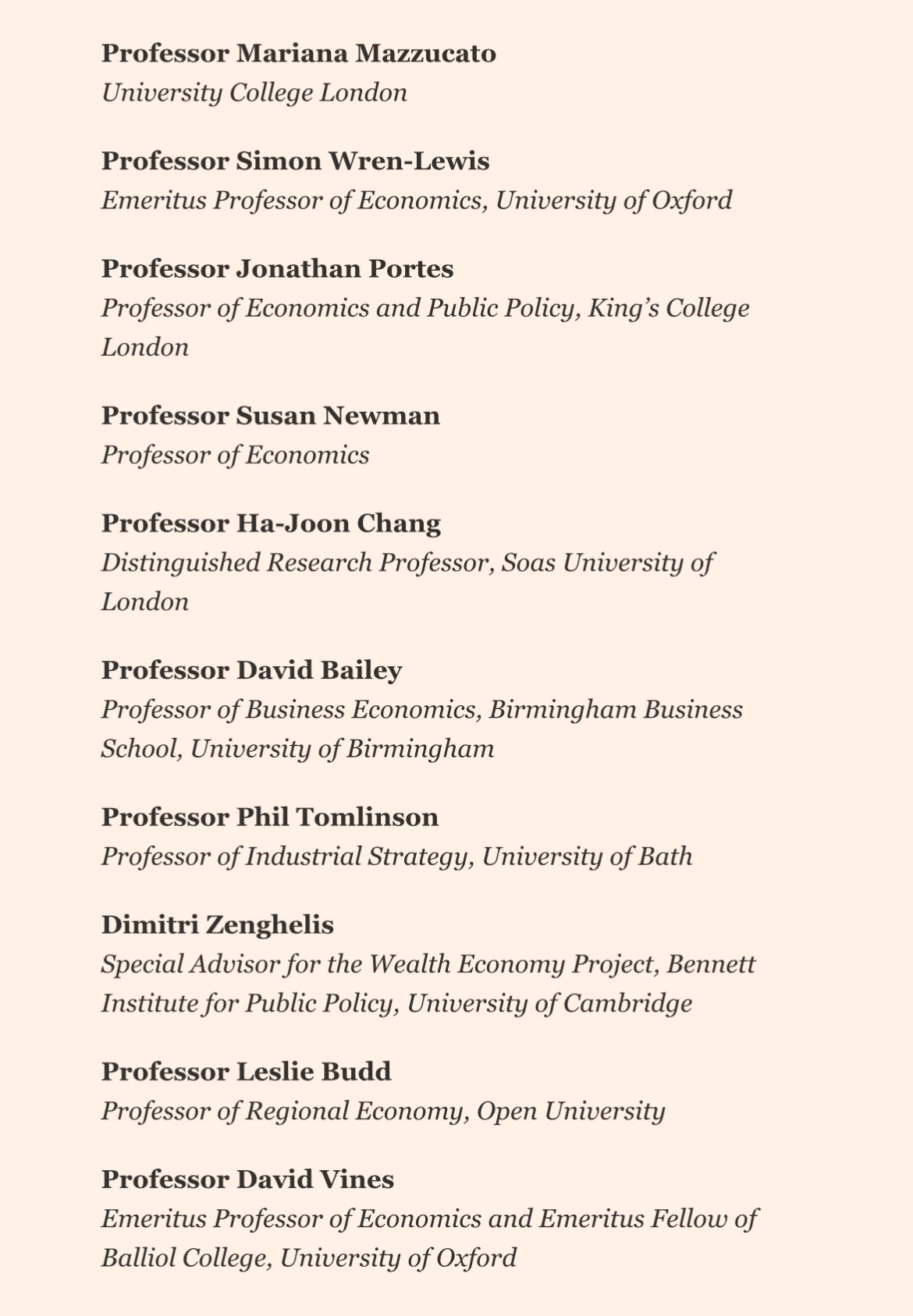
Andy Haldane, former chief economist at the Bank of England wrote a cogent, measured, but very clear opinion piece in the FT last weekend but one:
“The case for public sector reform is overwhelming. But with the economy stalled, further fiscal belt-tightening is impossible to justify on macroeconomic grounds. It ignores the painful lessons of austerities past. The chancellor's quick-fire ideological conversion to Treasury orthodoxy is equally unfathomable since it imperils both growth and her own standing.”
Andy Haldane, ‘It is time to rewrite “Treasury Brain”’ - FT weekend, 15-16 March 2025.
I’m no economist - far from it. (Humanities here. Sorry.) But even I know enough to see there are many alternatives and smart theories out there, all of which are ready and available for a Labour or Democrat government to take on. You might say that these are ‘only theories’ - we don’t know if they will work. Well, monetarist neoliberal fiscal conservatism was just a theory too, but helpfully, we now know that in practice this simply does not work - at least, if the goal is to create a thriving economy that benefits everyone. Of course, if the goal is to hoard wealth at the top and increase inequality, it works gangbusters.
So what is the major malfunction?
We see Reeves baulking at further borrowing or quantitative easing (‘printing money’, although more complex) or indeed, simply hitting a zero in the budgets column - despite the fact that vast borrowing and QE was accepted by successive Tory Governments.3 Indeed this government has continued with quantitative tightening (‘burning money’, although more complex). And most of all we see them refusing further taxation - especially of the wealthy.
So why? Perhaps the answer has little to do with ‘what works’, or certainly something as idealistic as ‘what is right’. More likely it is because they fear the right wing press turning on them, and the bond markets crashing. This is not an unimportant factor. Who can blame them for not wanting to watch that disastrous shitshow happen again? Some claim that can be avoided by a softer approach. Some (eg Modern Monetary Theorists) say it can be toughed-out because we have a sovereign currency. Some say the risk is worth it. And some point out that other economies have dealt with this and survived, especially if it is clear that it is for investment. Germany’s investment of €500bn in defence spending will pour money into the real economy and their post industrial left-behind towns. It is an excellent investment, whatever you think of defence spending. Starmer had this opportunity to do this too - and squandered it.4
Reeves is sticking to her ‘fiscal rules’, most of which are just self-inflicted harm, and remind me of the kind of ‘rules’ that people with obsessive disorders adopt.5 Her refusal to tax working people more would be admirable if she was willing to tax unworking, economically unproductive people more. No, not THOSE unworking scroungers - the other ones...
So again, we have to ask - by this stage, pleading, baffled, like someone dragged in the back of a van with a bag over their head in an episode of The Sopranos. WHY?
The arguments put forward by Mazzucato and ten other economists, Haldane, the MMT professors, are not just shrill tribal hectoring (unlike this blog). These are smart people who I suspect know more than all the brains in the think tanks and the treasury. And yet, the arguments those experts are making are both absolutely right, and fundamentally flawed.
The fundamental difference between the two approaches here is not about instruments or approaches - it is about what is considered ‘success’ in our economy. If you think a properous economy with high wages, good public services, and low levels of inequality is a success, you are looking in the wrong place. Because greater equity, and shared prosperity is precisely what is being resisted.
Austerity, contrary to what many of us are saying, works brilliantly. It just depends on what you’re trying to achieve.6
I started by quoting Reeves and her justifications in the face of those who voted for her. When I first wrote this, I wanted to say that I felt sure that Reeves herself did not want further inequality and to simply protect wealth. But I don’t want to say that any more.
These policies are either ignorant or immoral, or cowardly. We may never know which.
But they are utterly wrong.
Slapheads of the world unite
I’ll leave the last word to Brian Eno, patriotic millionaire, and my husband’s second favourite bald person (I hope). Eno argues cogently, affably, and with real humility, for an incredibly modest wealth tax.
Please watch it. You’ll feel better. And you’ll be assured that there really are one or two decent rich people out there.
Weekly memes
Because comedy has been in short supply this week, I leave you with some memes. It’s hard to find UK memes - they’re far more likely to be extremely right wing, whereas in the US, the left is pretty great at memes because they have pretty much no leftist movement at all apart from that. So be glad.
Anyway they’re mostly about Tesla because, you know, great material. (I just want to be clear that I hated Elon Musk when everybody thought he was a genius.)
See you in a couple of weeks, unless I have one of my moments again in the meantime.
If you can share these posts on LinkedIn and other social media it would really help - they tend to get throttled on Linkedin when I post them myself.
- Alex
Barely Civil Society is trying to create deeper debate in the UK charity sector.
Here are three ways to help.
1. Subscribe
2. Share
Or….
Owen Jones does an excellent job of outlining this in the first chapter of ‘The Establishment’. Regarding links here, I’ve included links to people writing about the books rather than the books thesmelves - I’m presuming you have a life, and I too have really struggled with the sheer volume...
Mazzucato, I hear, has been consulted by the Labour Government, albeit sadly not well-understood, it appears. Or perhaps, you can agree with what she says, but you’re just not allowed to do anything about it.
…for all manner of nest-feathering purposes such as giving Covid contracts to their mates or tax breaks to win elections.
Why don’t they go for more taxation? Again, their fear is being destroyed by the rich - left wing economics activist and ‘influencer’ Gary Stevenson is being attacked more viciously the more famous he becomes, and his levels of paranoia and sheer rage at the gaslighting he is having to face are only getting worse. But just because you’re paranoid doesn’t mean they aren’t out to get you - they are. The wealthy will throw every ideological tool they have at you if you challenge their power. That is what the Labour Government equally fears.
She might as well be retching when she touches the underside of the soap.
As one meme put it, whenever we hear ‘the economy’ we should replace it with ‘rich people’s yacht money’:
Or, as Bill Clinton would have said, “It’s the [rich people’s yacht money], stupid.”


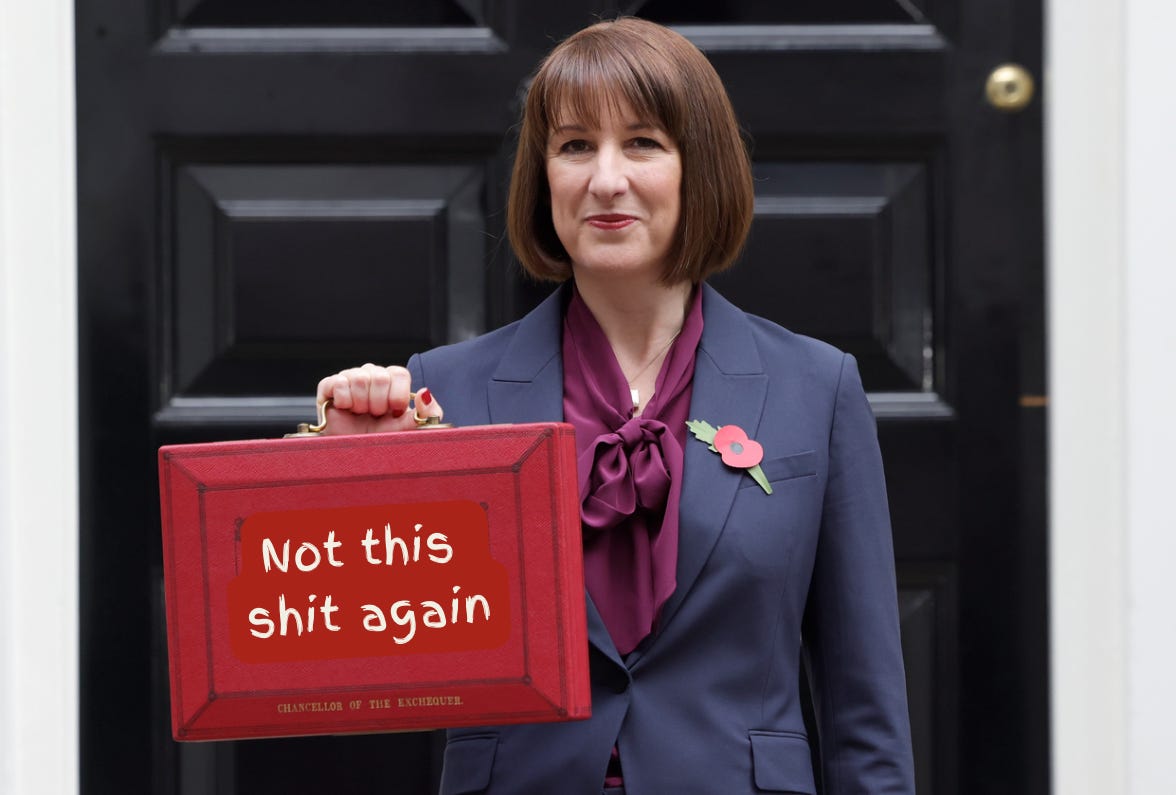

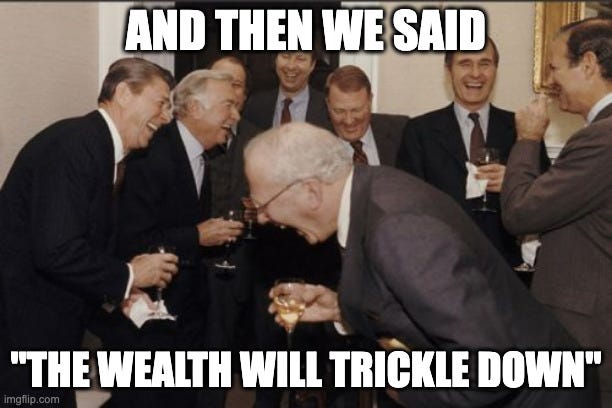

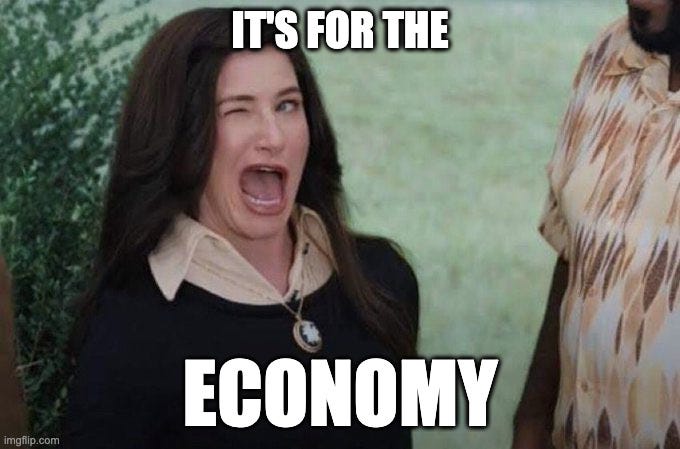





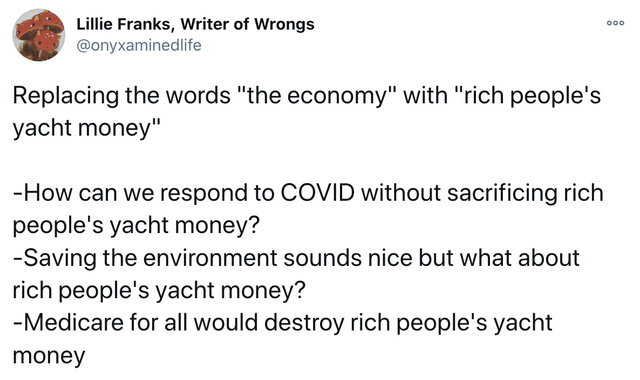
https://open.substack.com/pub/steveboatright/p/lucre?utm_source=share&utm_medium=android&r=4ch5sb